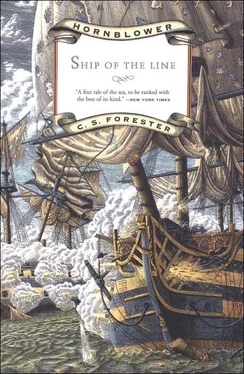Someone on deck spied him now. He could hear the pipes twittering as preparations were made to receive him. Let ‘em wait a bit longer; he was not going to be hurried today. The Sutherland, riding high without her stores in her, was showing a wide streak of her copper. That copper was new, thank God. Before the wind the ugly old ship might show a pretty turn of speed. As the wind swung her across the tide she revealed her run to him. Looking over her lines, Hornblower occupied his mind with estimates of how to get the best performance out of her. Twenty-two years of sea going experience helped him. Before his mind’s eye he called up a composite diagram of all the forces that would be at work on her at sea—the pressure of the wind on her sails, the rudder balancing the headsails, the lateral resistance of the keel, the friction of the skin, the impact of waves against her bows. Hornblower sketched out a preliminary trial arrangement, deciding just how (until practical tests gave him more data) he would have the masts raked and the ship trimmed. But next moment he remembered bitterly that at present he had no crew to man her, and that unless he could find one all these plans would be useless.
“Give way,” he growled to the wherry men, and they threw their weight on the oars again.
“Easy, Jake,” said bow oar to stroke, looking over his shoulder.
The wherry swung round under the Sutherland’s stern—trust those men to know how a boat should be laid alongside a ship of war—giving Hornblower a sight of the stern gallery which constituted to Hornblower one of the most attractive points about the ship. He was glad that the dockyard had not done away with it, as they had done in so many ships of the line. Up in that gallery he would be able to enjoy wind and sea and sun, in a privacy unattainable on deck. He would have a hammock chair made for use there. He could even take his exercise there, with no man’s eye upon him—the gallery was eighteen feet long, and he would only have to stoop a little under the overhanging cove. Hornblower yearned inexpressibly for the time when he would be out at sea, away from all the harassing troubles of the land, walking his stern gallery in the solitude in which alone he could relax nowadays. Yet without a crew all this blissful prospect was withheld from him indefinitely. He must find men somewhere.
He felt in his pockets for silver to pay the boatmen, and although silver was woefully short his self-consciousness drove him into overpaying the men in the fashion he attributed to his fellow captains of ships of the line.
“Thank ‘ee, sir. Thank ‘ee,” said the stroke oar, knuckling his forehead.
Hornblower went up the ladder and came in through the entry port with its drab paint where in the Dutchmen’s time gilding had blazed bravely. The pipes of the boatswain’s mates twittered wildly, the marine guard presented arms, the sideboys stood rigidly at attention. Gray, master mate—lieutenants kept no watch in harbour—was officer of the watch and saluted as Hornblower touched his hat to the quarterdeck. Hornblower did not condescend to speak to him, although Gray was a favourite of his; the rigid guard he kept on himself for fear of unnecessary loquacity forbade. Instead he looked round him silently.
The decks were tangled with gear as the work of rigging the ship proceeded, but the tangle, as Hornblower was careful to note, Carried under its surface the framework of orderliness. The coils of rope, the groups at work on the deck, the sailmaker’s party sewing at a topsail on the forecastle, gave an impression of confusion, but it was disciplined confusion. The severe orders which he had issued to his officers had borne fruit. The crew of the Lydia when they had heard that they were to be transferred bodily to the Sutherland without even a day on shore, had nearly mutinied. They were in hand again now.
“Master-at-arms wishes to report, sir,” said Gray. “Send for him, then,” answered Hornblower.
The master-at-arms was the warrant officer responsible for enforcing discipline, and was a man new to Hornblower, named Price. Hornblower concluded that he had allegations of indiscipline to lodge, and he sighed even while he set his face in an expression of merciless rigidity. Probably it would be a matter of flogging, and he hated the thought of the blood and the agony. But, at the beginning of a commission like this, with a restive crew under his orders, he must not hesitate to flog if necessary—to have the skin and flesh stripped from the offenders’ backbones.
Price was coming along the gangway now at the head of the strangest procession. Two by two behind him came a column of thirty men, each one handcuffed to his neighbour, save for the last two who clanked drearily along with leg irons at their ankles. Nearly all of them were in rags, and the rags had no sort of nautical flavour about them at all. The rags of a great many of them were sacking, some had corduroy, and Hornblower, peering closer, saw that one wore the wrecks of a pair of moleskin breeches. Yet another wore the remains of what had once been a respectable black broadcloth suit—white skin showed through a rent in the shoulder. All of them had stubbly beards, black, brown, golden, and grey, and those who were not bald had great mops of tangled hair. The two ship’s corporals brought up the rear.
“’Alt,” ordered Price. “Orf ‘ats.”
The procession shuffled to a halt, and the men stood sullenly on the quarterdeck. Some of them kept their eyes on the deck, while the others gaped sheepishly round them.
“What the devil’s all this?” demanded Hornblower sharply.
“New ‘ands, sir,” said Price. “I signed a receipt to the sodgers what brought ‘em, sir.”
“Where did they bring them from?” rasped Hornblower.
“Exeter Assizes, sir,” said Price, producing a list. “Poachers, four of ‘em. Waites, that’s ‘im in the moleskin breeches, sir, ‘e was found guilty of sheepstealing. That ‘un in black, ‘is crime’s bigamy, sir—‘e was a brewer’s manager before this ‘appened to ‘im. The others is larceny mostly, sir, ‘cept for them two in front what’s in for rick burning and t’other two in irons. Robbery with violence is what they done.”
“Ha-h’m,” said Homblower, wordless for the moment. The new hands blinked at him, some with hope in their eyes, some with hatred, some with indifference. They had chosen service at sea rather than the gallows, or transportation, or the gaol. Months in prison awaiting trial accounted for their dilapidated appearance. Here was a fine addition to the ship’s company, thought Hornblower, bitterly—budding mutineers, sullen skulkers, half-witted yokels. But hands they were and he must make the most of them. They were frightened, sullen, resentful. It would be worth trying to win their affection. His naturally humanitarian instincts dictated the course he decided to pursue after a moment’s quick thinking.
“Why are they still handcuffed?” he demanded, loud enough for them all to hear. “Release them at once.”
“Begging you pardon, sir,” apologised Price. “I didn’t want to without orders, sir, seeing what they are and ‘ow they come ‘ere.”
“That’s nothing to do with it,” snapped Hornblower. “They’re enlisted in the King’s service now. And I’ll have no man in irons in my ship unless he’s given me cause to order it.”
Hornblower kept his gaze from wavering towards the new hands, and steadily addressed his declamation to Price—it was more effective delivered that way, he knew, even while he despised himself for using rhetorical tricks.
“I never want to see new hands in charge of the master-at-arms again,” he continued, hotly. “They are recruits in an honourable service, with an honourable future before them. I’ll thank you to see to it another time. Now find one of the purser’s mates and see that each of these men is properly dressed in accordance with my orders.”
Читать дальше









